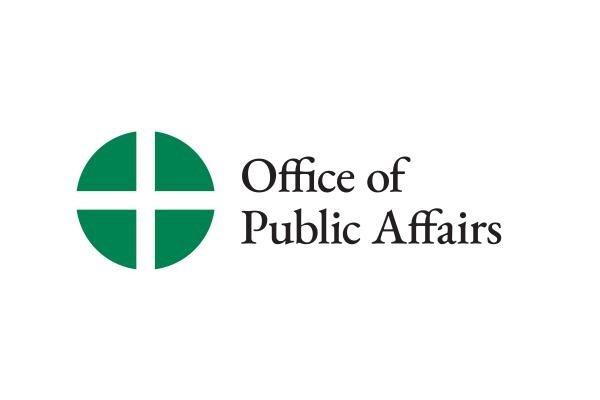Bishop Blaire Urges Greater Protection Against Payday Loans in Letter to Consumer Financial Protection Bureau
WASHINGTON—Working people struggling to support themselves and their families should be protected from lenders who look to exploit their financial insecurity, said Bishop Stephen E. Blaire of Stockton, California, chairman of the Committee on Domestic Justice and Human Development of the U.S. Confer
November 14, 2013
WASHINGTON—Working people struggling to support themselves and their families should be protected from lenders who look to exploit their financial insecurity, said Bishop Stephen E. Blaire of Stockton, California, chairman of the Committee on Domestic Justice and Human Development of the U.S. Conference of Catholic Bishops (USCCB).
In a November 13 letter to Richard Cordray, the executive director of the Consumer Financial Protection Bureau, Bishop Blaire said that payday loans are often “structured in such a way as to make repayment very difficult, initiating a cycle of deeper indebtedness that adds to borrowers’ financial stress, rather than relieving it.” Workers can borrow payday loans, for a fee, against their next paycheck. Payment in full is due on the next payday. Payday loans usually carry two week terms.
Bishop Blaire pointed out that the Catechism of the Catholic Church warns against taking advantage of hardship and equates it with theft. The Compendium of the Social Doctrine of the Church says that “[a]lthough the quest for equitable profit is acceptable in economic and financial activity, recourse to usury is to be morally condemned.”
Recognizing how harmful payday lending can be to people living in poverty, many grantees of the Catholic Campaign for Human Development (CCHD) have fought for consumer protections, such as placing limits on the rates and fees that payday lenders can charge. The U.S. Conference of Catholic Bishop’s annual CCHD collection is slated for November 23-24, the weekend before Thanksgiving. The collection is taken up in parishes and dioceses nationwide.
Bishop Blaire added, “Poor and vulnerable working people deserve loan options that they can repay in a timely manner and that advance their long-term financial security, rather than consign them to a cycle of debt.”
Bishop Blaire concluded his term as chairman of USCCB Domestic Justice and Human Development November 14 and is succeeded by Archbishop Thomas G. Wenski of Miami.
The letter can be found online: www.usccb.org/issues-and-action/human-life-and-dignity/poverty/domestic/upload/usccb-payday-cordray-cfpb.pdf
---
Keywords: Bishop Stephen E. Blaire, Domestic Justice and Human Development, Catholic Campaign for Human Development, CCHD, human dignity, poverty, Catholic social teaching, National Collections
# # # # #
MEDIA CONTACT ONLY
Don Clemmer
O: 202-541-3206
Email:
In a November 13 letter to Richard Cordray, the executive director of the Consumer Financial Protection Bureau, Bishop Blaire said that payday loans are often “structured in such a way as to make repayment very difficult, initiating a cycle of deeper indebtedness that adds to borrowers’ financial stress, rather than relieving it.” Workers can borrow payday loans, for a fee, against their next paycheck. Payment in full is due on the next payday. Payday loans usually carry two week terms.
Bishop Blaire pointed out that the Catechism of the Catholic Church warns against taking advantage of hardship and equates it with theft. The Compendium of the Social Doctrine of the Church says that “[a]lthough the quest for equitable profit is acceptable in economic and financial activity, recourse to usury is to be morally condemned.”
Recognizing how harmful payday lending can be to people living in poverty, many grantees of the Catholic Campaign for Human Development (CCHD) have fought for consumer protections, such as placing limits on the rates and fees that payday lenders can charge. The U.S. Conference of Catholic Bishop’s annual CCHD collection is slated for November 23-24, the weekend before Thanksgiving. The collection is taken up in parishes and dioceses nationwide.
Bishop Blaire added, “Poor and vulnerable working people deserve loan options that they can repay in a timely manner and that advance their long-term financial security, rather than consign them to a cycle of debt.”
Bishop Blaire concluded his term as chairman of USCCB Domestic Justice and Human Development November 14 and is succeeded by Archbishop Thomas G. Wenski of Miami.
The letter can be found online: www.usccb.org/issues-and-action/human-life-and-dignity/poverty/domestic/upload/usccb-payday-cordray-cfpb.pdf
---
Keywords: Bishop Stephen E. Blaire, Domestic Justice and Human Development, Catholic Campaign for Human Development, CCHD, human dignity, poverty, Catholic social teaching, National Collections
# # # # #
MEDIA CONTACT ONLY
Don Clemmer
O: 202-541-3206
Email:

